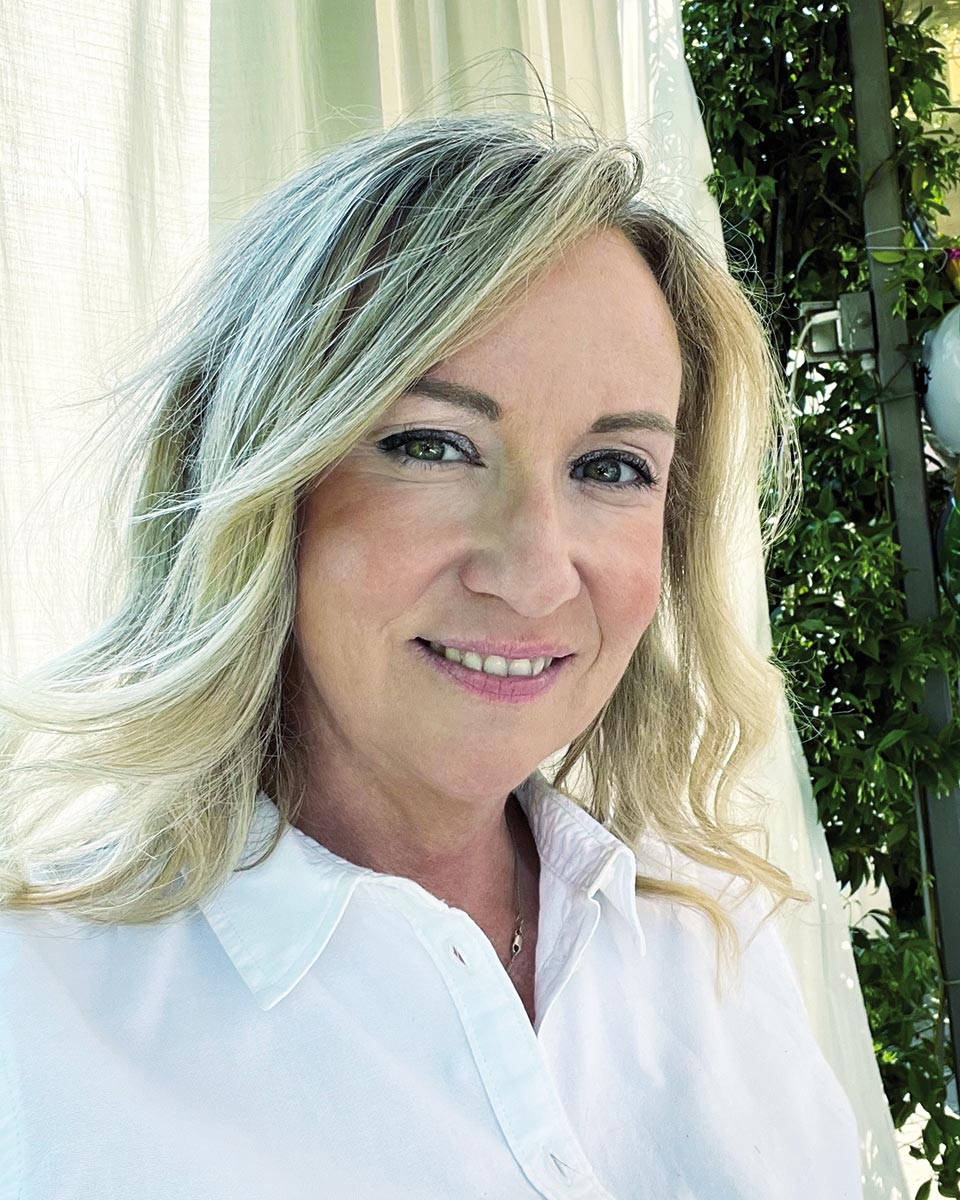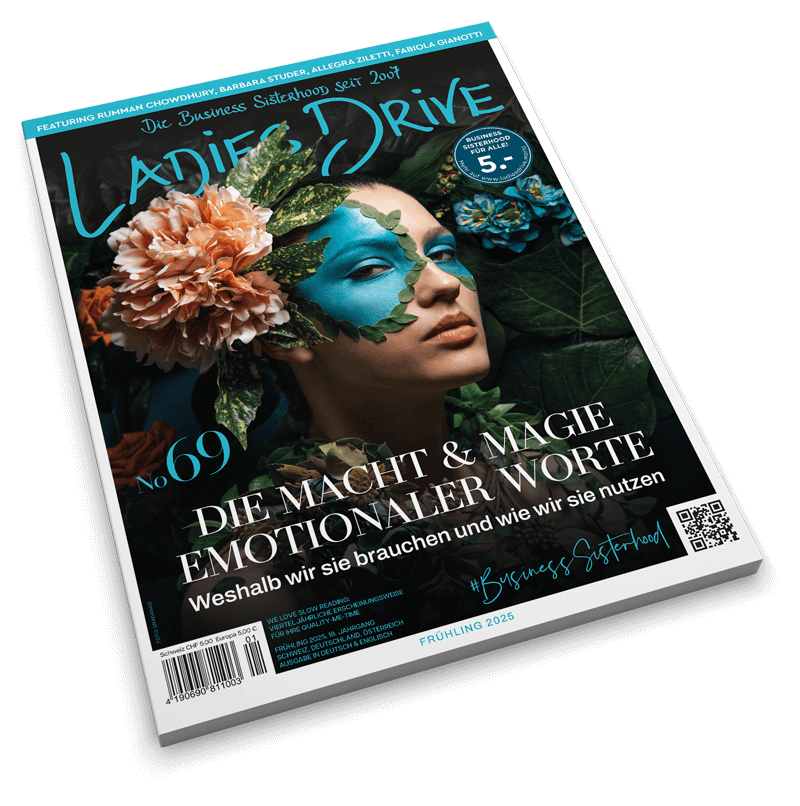Triumph Group, founded in 1886 in Germany, still today a family-owned company, is the maker of the world’s leading lingerie and shapewear brands. With its global headquarters in Switzerland, the company has an international presence in over 80 countries. Known for combining innovative design, superior craftsmanship, and comfort, Triumph has become synonymous with quality and unparalleled fit in the intimate apparel industry.
In recent years, Triumph has focused on being as socially and environmentally responsible as possible. The Group worked on minimising its environmental impact by introducing eco-friendly materials and production methods. The brand achieved significant success with its “Smart” range, catering to diverse body types and modern consumer needs. By consistently embracing innovation and inclusivity, Triumph remains a trailblazer in redefining lingerie for women worldwide.
Allegra Ziletti serves as Global Head of Consumer Engagement at Triumph where she drives the brand’s strategic marketing consumer-centric initiatives. With over 20 years of experience across luxury goods, fashion, beauty, and retail sectors, Allegra has established herself as a visionary leader in brand strategy and global market dynamics.
In her role, she emphasises authenticity and emotional resonance in branding, aiming to create meaningful connections between Triumph and its consumers. “Our mission is to celebrate the individual. To create personal experiences that foster a long-lasting bond, innovative products and services that feel made to measure for our consumer. It’s about moving beyond a one-to-many approach, towards a one-to-one relationship – building a community, a safe space for women to exchange with us and among themselves,” she has stated in interviews.
Ziletti is particularly focused on innovation, steering Triumph towards adaptive marketing strategies to meet the evolving expectations of modern consumers. Her leadership reflects a blend of creativity, business acumen, and a passion for celebrating women globally. We meet for the interview on Zoom just before she walked on stage at the 2025 World Economic Forum in Davos to share her point of view on the future of marketing.
Ladies Drive: If I look at your education and your CV, this is just stunning. I mean, A.T. Kearney, Sony, L’Oréal, Dior, global marketing director at Stella McCartney, then Tiffany & Co., marketing director Italy and Spain. Now, Triumph Lingerie, global head of consumer engagement. That’s a stunning career!
Allegra Ziletti: Thank you. I think the main thread is that I’m passionate and I need to feel a special connection for the brand I am the ambassador of, and a purpose in what I’m doing. So I always worked for love brands, brands that I actually love and whose values I share. And I think I always try to put myself into the consumer’s shoes and try to add value from that point of view.
It was always a dream to work in fashion. And you know, my first paid job was a runner at the Donna Karan showroom in Milan during sales campaigns and during fashion week. That was a very, very well-paid job. I wanted some pocket money during university.
I studied at Bocconi University in Milan. I always wanted to have a proper career, to create impact with what I do and make a difference. I was studying Public Administration and International Relations as I’ve always been interested in anthropology, economics, geography, history, law, philosophy, and sociology, wanted to better understand the special kind of power relationships that exist within the different communities and try to facilitate that intercultural exchange. But then I attended a business game by L’Oréal, where you had to put yourself into the consumer’s shoes and come up with a new idea and resolve a business case. And I was only in my second year of university. I had taken no marketing course at all at that time and was just putting myself in the consumer’s shoes. And I won. That was the first time when I realised: wow, this is really what I like! What I want. Where I can add some value. And that’s when I changed my studies and took a major in marketing and in fashion management. And since then, I think my career is always very well, very well planned.
Usually, most women I’ve interviewed in the past 20 years for Ladies Drive tell me that their career was not planned. Can you share how you did it?
You know, first, I did strategic consulting, because it will give me exposure to top management that I would have never had as an intern in a company. That helped me to have a very good analytical mindset and the ability to challenge data. Also, it developed skills in prospecting and presenting and gave me an overview of very broad, different topics, business challenges. But after that, I realised I wanted to go back to my first love: marketing – that was in 2001 with the US economy slowing down and companies starting to cut expenses like advertising and consulting. After that, my career has been really planned step by step, brick by brick, from junior product manager to product manager to brand manager.
And then, after a traditional career marketing path I worked on my skill set in new cutting-edge digital technologies like digital marketing, CRM, e-commerce – in 2004 that was unique especially in the fashion industry. Then I had the possibility to join LVMH, as a leader in luxury on a flagship brand like Dior. It was a great school in luxury and brand management. It taught me a very rigorous brand management, the attention to detail, always positioning the brand in the most important environment in line with the brand values. And after that, I had the great opportunity to step up to a global marketing director role at Stella McCartney. But most importantly, really to build a team to really recruit and structure a team, that did not exist. Because Stella McCartney has always been a PR-driven company. And I was appointed to bring that consumer-centric focus and to recruit new consumers to the brand and increase the brand and product awareness without relying on leveraging Stella as a celebrity. It was a very, very fast-paced and really a great learning curve. I was also very happy to work in a global role, to have that global remit and to, again, to carry on that curiosity for different cultures and getting very good insights on global consumer and high net worth individuals. That’s something that I could really leverage at Tiffany & Co. That was a much bigger organisation compared to Stella, obviously. And then to step up to a C-level role with Paul & Shark, with a strong focus on sustainability and giving back to the planet to recycle and try really to close the loop. And then, yes, most recently in Triumph. I love the Triumph vocation of supporting women since 1886. I mean, supporting literally, but also advancing, supporting in many ways. And here as a global head of consumer engagement, my aim is to build a community, to build a safe space for women to exchange among each other and to exchange with the brand so that we can support women throughout all the different life cycles. With products tailored to their needs so that they can also feel reassured, more secured and ultimately more confident no matter which stage of their life they are going through, and as women we go through a lot.
Whilst listening to you, to all that you just have been sharing, is there in your career something like an underlying theme where you could say, this is what really drives me?
Yes, I think it’s passion, but also always learning new things. And that’s what I love about marketing. I mean, I never have one day like another. And of course, the world is evolving, marketing techniques are evolving but also customer behaviours, their needs, their aspirations. And so, I think you must try to keep up with really if you want to connect and to be successful. And that’s what I love about always reading, always trying to understand what’s next, how we can leverage the next trend and jump on the next bandwagon to advance. It’s both for my personal and professional development to try to make a difference, to differentiate still in a genuine way that gives something back to the consumer.
Is there something you would call the most painful lesson that you experienced in business?
I think probably it was at Stella McCartney. As I said, it was an extremely fast-paced environment. It was also, let’s say, my first truly managerial experience. And that’s where I think I learned so much because at some point I was not able anymore to stand up the pressure and to diffuse it. And somehow you are in this circle, it’s a bit hysterical. And I think I passed on a lot of attention, a lot of stress to the team. But it helped me so much to develop for my future to change my attitude, to try to always protect the team, to try to diffuse and always try to motivate them so they could feel recognised. I was working honestly 24/7, almost 18 hours a day because it was in a global role, in a startup environment. Because when I joined Stella, the company was only five years old. And so, at some point, I think I almost burned out in a way. And I was not able to keep up that pressure anymore. But that’s when I realised how I could have done things differently. And that’s what I tried to do in my following roles. I always try to take the positive out of things, try to take the learnings out of everything that life throws at you, really. I mean, maybe some people could consider it a failure. I want to look at it with a positive spin, because it’s an experience that shaped me so much and really made me a better person, a better leader.
It’s an experience that shaped me so much and really made me a better person, a better leader.
Yeah, it’s so weird that we as human beings sometimes need to go through pain to end up as a better person at the end …
Yes. Maybe – for very driven people so focused on achievements, then the lesson needs to be harder. Today I’m a much more active listener and much more self-aware.
But you said something very interesting, as a leader, we are taught to be confident and assertive but almost nobody teaches you to listen.
Yeah. It’s something I learned along the way, as you know, in the beginning I was much more self-centred and again, very task-oriented, very process-oriented, getting, you know, the job done.
Would you say that you are a kinder person today?
For sure, for sure, yes, for sure. Yeah.
Then I’m sure you must have heard of kindness economy?
Sure. Especially, due to the experiences the world went through in recent years, people really crave for more authentic connections. I think the world is changing, culture is changing. I’ve also noticed a new trend on social media in the USA and U.K.: the so-called kindness economy, recognising the importance of kindness in the business ecosystem. I think sometimes aggressive behaviour is just a sign of insecurity, right? While if you are self-assured, if you’re confident and grateful you can be more kind and give back. I think, this is the future. And if I think about Gen Z, they are really authenticity seekers. They grew up with deep anxieties, with social isolation. And that’s when also this kind of economy comes in to try to, let’s say, break down that instability, that uncertainty, that unfortunately is what characterises today’s world.
It’s also a way in which you can really win trust and loyalty. This is something else I’m working on right now, and I will be speaking here in Davos during WEF to a panel about: the future role of marketing. And about the trust economy, because this is what drives now, I believe, consumer engagement. People want to feel aligned with brand values. And they really want to trust the brand – they just don’t want to be sold to. They want authenticity, they want to make sure that they share the same values with the brand they choose to be loyal to.
Do you think there is enough room to nurture this kindness and trust economy, specifically in an industry like fashion?
I see it as very difficult to be done in a genuine way. The beauty of fashion is that it’s run by great creative people, right? To be creative, you need to have a very strong point of view. And unfortunately, sometimes, with that comes a strong ego, which does not really go hand in hand with kindness. While to me kindness means being empathic and being open to others and listening to other people’s needs and aspirations. And unfortunately, I feel fashion is still very much led by brand, by brand management. This is the brand; this is who I am either you like it, or you don’t. And if you don’t, I don’t care. But I think there are some personalities that are trying to change that, like J.J. Martin, the founder and the owner of Double J. She tries to bring her personality, really her true self and focusing on the inner world than just on the external appearances. And like in every industry, there are some visionary leaders. Brunello Cucinelli is doing a lot for the community, trying to give back, trying to bring some family values and have a bit of a kinder approach to his employees and the community he lives and works in.
So, can you share a little bit about what you are going to talk about on stage during the World Economic Forum, just in a nutshell, the future of marketing, also from the point of view of your company, Triumph?
I will be talking about what the future role of marketing will be and how brands can prepare for disruption, keep innovating while building trust differentiation. And how important it is to align with societal values, such as sustainability, but also social justice, equality, for brands to resonate deeply and authentically with consumers. And so, it’s about leveraging insights to build adaptive marketing strategies during this time of economic uncertainty.
I see “ACTVERTISING” a lot as one of the ways forward, which is not only advertising anymore, but it’s about pairing campaigns with cause-related actions that support the campaign’s underlying message to promote tangible changes.
These days brand activism is expected. Today people expect you to pick your side, because they want to know who you are, and whether they resonate with your values or not, so it’s very important, to be honest, to be transparent on your practices.
And then another big trend for me is, as people are not satisfied with being sold to, but they really want to take the wheel in the brand storytelling, if they align with your values. And ultimately, people want to even help to co-create, instead of passively consuming. And so, this brings a lot of conversations on the role of creators, and how, let’s say, brands need to release control. But I think this is the only way also to engage with Gen Z, because they are 3.5 times more likely to engage with brands that have been incorporating user-generated content in their communication.
So, you should not shy away from creator content that feels different but allow them to express and to interpret the brand according to their distinctive style. Which is completely the opposite of the very rigorous brand management I learned, for instance, at LVMH 15 years ago.
Ultimately, it must be either very exciting or very simple to buy – that’s why to have a well-thought 360 omnichannel approach is very important. I don’t want to talk anymore about the purchase funnel: from awareness to consideration to purchase and loyalty, but of a trust loop.
I couldn’t agree more! So, you work with Salesforce. That’s how we came together in the first place. So how does Salesforce specifically help you to reach your goals in marketing?
Salesforce has been a great, great partner. I think, you know, they have a state-of-the-art innovation and technology platform. I also very much appreciate their consultative approach. We are using several different products that allow us really to connect and interact with our consumer on many different channels. So not only emails, but also most recently SMS and WhatsApp. Salesforce gives us the tools to be there where the consumers are. More and more people are moving away from emails to WhatsApp which is more direct, more immediate.
And then a big project we’re working on with Salesforce now is personalisation: on product recommendations, but not only. It’s about delivering the right message, and why not, the right offer, at the right time on the right channel to the right client – which is key to be relevant. A very concrete example: it doesn’t make sense sending an email about PushUp – because PushUp is our latest product – to a woman with big breasts who usually buys a minimiser. That would even damage our brand credibility because our customers may think that we do not know their needs.
And we want to really personalise the full journey, not only the products and the messaging, of course, but ideally also the price and the promotion. This will also unlock a great success for the company overall – unlocking growth in a profitable way. Through this personalisation, it means that we’re not obliged to give a 50 % discount to everyone during sales. Overall, this personalisation will feel more relevant for the consumer, who will hopefully also enjoy a discount just on the products they’re interested in – and not on all products.
So more relevant for the consumer who would feel their needs are recognised and ultimately more profitable for the company because it will decrease overall costs. If something feels relevant, you’re more likely to buy and therefore that will increase conversion, it will increase revenues with the decreasing cost. It’s ultimately, it’s a win-win.
So, the return on your investment for Salesforce is a win?
For sure. Well, it depends on how you leverage it. I try to have a global approach; therefore, I can leverage synergies across different markets and standardise technology platform, process and procedures, and therefore leverage economy of scales. Ultimately you can internalise, scale up your business and leverage it – that brings you a competitive advantage, not only in terms of knowledge but also in terms of being independent, being more agile and more responsive. And in terms of costs and not being dependent on external agencies to run Salesforce for you.
That leaves me with one last question for you. What would you advise your younger me?
Oh, wow. Difficult! To look more inside myself, to try to be less dependent on external approval and to really focus on what makes me happy, what I would ultimately want. I think I’ve always been quite dependent on getting external approval or even conforming with society and not so much in pursuing what really made me happy. We only have this one life, and you must take care of yourself.






